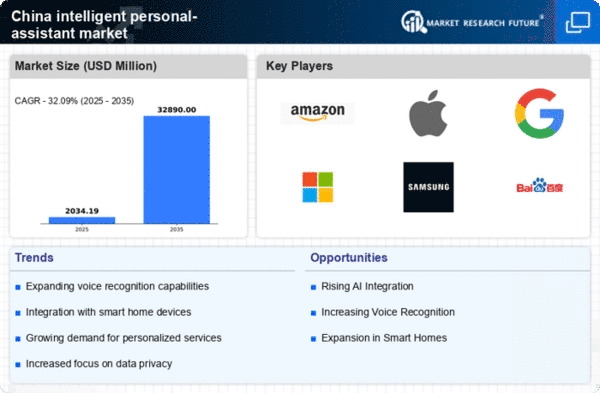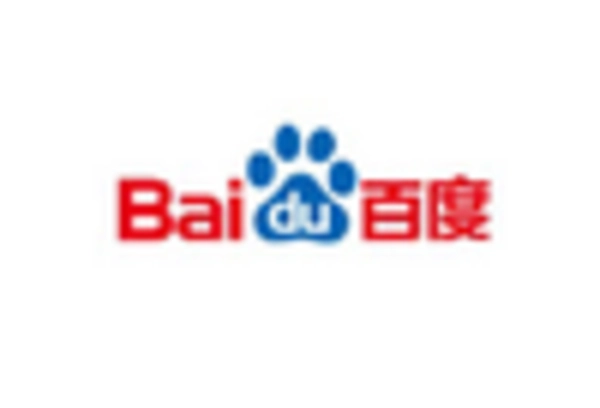Increased Smartphone Penetration
The rapid increase in smartphone penetration across China serves as a significant driver for the intelligent personal-assistant market. With over 1 billion smartphone users in the country, the accessibility of intelligent personal assistants has never been greater. The convenience offered by these assistants, such as scheduling, reminders, and information retrieval, aligns well with the fast-paced lifestyle of urban consumers. Market data suggests that approximately 70% of smartphone users in China utilize some form of intelligent personal assistant, indicating a strong market presence. This widespread usage encourages developers to enhance features and functionalities, thereby attracting more users. Additionally, the competitive landscape among smartphone manufacturers compels them to integrate advanced personal-assistant capabilities into their devices, further stimulating market growth. As smartphone adoption continues to rise, the intelligent personal-assistant market is poised for substantial expansion.
Expansion of E-commerce Platforms
The rapid expansion of e-commerce platforms in China is significantly influencing the intelligent personal-assistant market. With the rise of online shopping, consumers are increasingly relying on intelligent personal assistants to facilitate their purchasing decisions. These assistants can provide product recommendations, track orders, and even assist with payment processes, thereby enhancing the overall shopping experience. Market analysis indicates that e-commerce sales in China are projected to reach $2 trillion by 2025, creating a fertile ground for intelligent personal assistants to thrive. Additionally, partnerships between e-commerce giants and technology firms are becoming more common, leading to the development of integrated solutions that leverage intelligent personal assistants. This synergy not only boosts sales for e-commerce platforms but also drives the adoption of intelligent personal assistants among consumers, further propelling market growth.
Focus on Enhanced User Experience
The emphasis on delivering an enhanced user experience is a vital driver for the intelligent personal-assistant market. As competition intensifies among technology providers, the need to differentiate products through superior user experience becomes paramount. Companies are increasingly investing in user interface design, personalization features, and seamless integration with other applications. Data suggests that user satisfaction is directly correlated with the effectiveness of intelligent personal assistants, prompting developers to prioritize user-centric design. In China, where consumer expectations are high, the ability to provide a tailored experience can significantly influence market success. Furthermore, feedback loops and continuous improvement processes are being implemented to refine functionalities based on user interactions. This focus on enhanced user experience is likely to attract more consumers to the intelligent personal-assistant market, fostering growth and innovation.
Growing Interest in AI and Machine Learning
The burgeoning interest in artificial intelligence (AI) and machine learning technologies in China is a crucial driver for the intelligent personal-assistant market. As businesses and consumers alike recognize the potential of AI to enhance productivity and efficiency, the demand for intelligent personal assistants is likely to increase. The Chinese government has made substantial investments in AI research and development, aiming to position the country as a leader in this field by 2030. This governmental support fosters innovation and encourages startups to enter the intelligent personal-assistant market. Furthermore, advancements in machine learning algorithms enable these assistants to learn from user interactions, improving their performance over time. As AI technology continues to evolve, it is expected that the intelligent personal-assistant market will experience significant growth, driven by enhanced capabilities and user satisfaction.
Rising Demand for Voice-Activated Technology
The increasing adoption of voice-activated technology in China is a pivotal driver for the intelligent personal-assistant market. As consumers seek hands-free solutions for daily tasks, the demand for voice recognition capabilities has surged. Reports indicate that the market for voice-activated devices is expected to grow at a CAGR of 25% over the next five years. This trend is fueled by the proliferation of smartphones and smart speakers, which are becoming ubiquitous in Chinese households. Furthermore, the integration of artificial intelligence in these devices enhances user experience, making them more appealing. Consequently, manufacturers are investing heavily in R&D to improve voice recognition accuracy and expand language support, which is crucial in a linguistically diverse market like China. This rising demand for voice-activated technology is likely to propel the intelligent personal-assistant market forward.
















